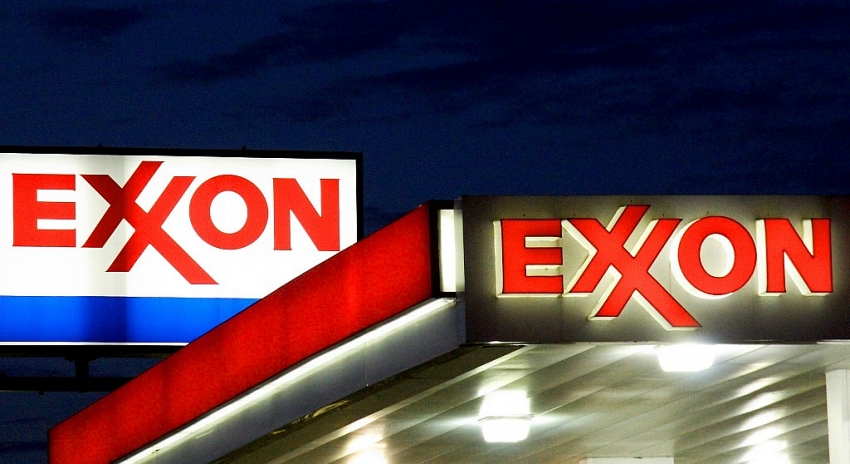Exxon Mobil, Chevron again report losses on low oil prices
 |
| In this file photo taken on September 20, 2008, Exxon signs at a station in Manassas, Virginia. Exxon Mobil said on October 29, 2020, it was eliminating 1,900 US jobs as part of a cost-cutting drive necessitated in part by the hit the Covid-19 pandemic inflicted on oil prices.(KAREN BLEIER / AFP) |
While both companies were hit by low commodity prices, driven by worldwide business and travel shutdowns, ExxonMobil had the bigger loss and again faced tough questions from investors over its strategy as shares tumbled.
The reports came a day after ExxonMobil announced it was cutting 1,900 US jobs, part of a plan to reduce global headcount by about 15 percent through 2022.
Chevron has also trimmed spending this year.
Company executives said they have been heartened by the comeback in consumption for diesel and gasoline but that jet fuel demand is still 45 percent below pre-Covid-19 levels.
ExxonMobil stressed that it expects demand to normalize after the pandemic, making continued investment in petroleum necessary. The company has long argued that a transition to zero-emission energy is years off.
"We remain confident in our long-term strategy and the fundamentals of our business, and are taking the necessary actions to preserve value while protecting the balance sheet and dividend," ExxonMobil Chief Executive Darren Woods said in a statement.
"We are on pace to achieve our 2020 cost-reduction targets and are progressing additional savings next year as we manage through this unprecedented down cycle."
ExxonMobil, which was bumped from the prestigious Dow Jones stock index in August following a plunge in its market value, reported a loss of $680 million, the third straight quarter without profitability. The company reported $3.2 billion profit in the same period of 2019.
Revenues fell 29 percent to $46.2 billion in the quarter.
At Chevron, which has much lower debt than ExxonMobil, the loss came in at $207 million, compared with profits of $2.6 billion in the year-ago period, as revenues fell 32.3 percent to 24.5 billion.
- Delayed recovery? -
Industry experts expect oil and refined product demand to recover once the world economy gets past the pandemic, but there remains much uncertainty on when that will happen.
A "delayed recovery scenario" in which the global economy comes back only in 2023 would require about four million barrels per day less of oil than if Covid-19 is gradually brought under control in 2021, according to a report released earlier this month by the International Energy Agency.
Under an IEA "sustainable development" scenario with more aggressive action to address climate change, oil demand through 2040 could fall to under 70 million barrels a day compared with around 100 million or more in the other scenarios.
Peter McNally, an analyst at consultancy Third Bridge, said he expects a partial recovery in oil demand in 2021 and a full recovery in 2022 and "some growth over the next decade."
The speed of a shift to electric cars should not be overstated, McNally said.
"Not everyone is going go buy a Tesla," he said. "It's going to take some time for that."
Shares of ExxonMobil dropped 0.9 percent to $32.67, while Chevron rose 1.0 percent to $69.50.
- Dividend debate -
ExxonMobil executives were pressed repeatedly on a conference call about their intention to maintain a generous dividend, which the company has long championed as a priority for it and its shareholders.
Earlier this week, ExxonMobil maintained its payment of 87 cents per share.
CFRA Research has estimated the dividend will cost ExxonMobil about $15 billion for the year, not far under the expected capital budget for 2021.
Senior Vice President Andrew Swiger said the company's base plan "conservatively assumes a gradual economic recovery" that includes somewhat higher oil prices consistent with leading third-party forecasts.
But he acknowledged that "all bets are off" if things turn out much different from that.
What the stars mean:
★ Poor ★ ★ Promising ★★★ Good ★★★★ Very good ★★★★★ Exceptional
 Tag:
Tag:
Related Contents
Latest News
More News
- The generics industry: unlocking new growth drivers (February 04, 2026 | 17:39)
- Vietnam ready to increase purchases of US goods (February 04, 2026 | 15:55)
- Steel industry faces challenges in 2026 (February 03, 2026 | 17:20)
- State corporations poised to drive 2026 growth (February 03, 2026 | 13:58)
- Why high-tech talent will define Vietnam’s growth (February 02, 2026 | 10:47)
- FMCG resilience amid varying storms (February 02, 2026 | 10:00)
- Customs reforms strengthen business confidence, support trade growth (February 01, 2026 | 08:20)
- Vietnam and US to launch sixth trade negotiation round (January 30, 2026 | 15:19)
- Digital publishing emerges as key growth driver in Vietnam (January 30, 2026 | 10:59)
- EVN signs key contract for Tri An hydropower expansion (January 30, 2026 | 10:57)






















 Mobile Version
Mobile Version